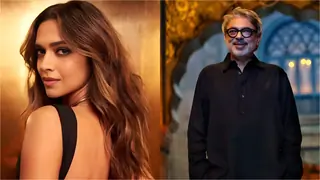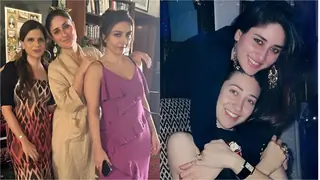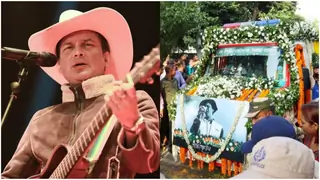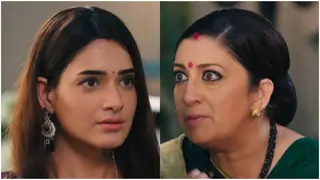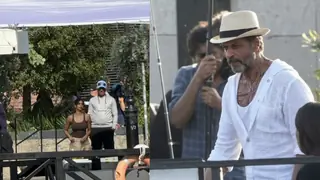
|
Dinesh Raheja Director Mehboob Khan, who fashioned thought-provoking classics like Mother India, Andaaz and Roti, also helmed the blockbuster love story Anmol Ghadi, in the 1940s. This sometimes maudlin musical is hugely famous for some immortal, gilded era songs tuned by Naushad and vocalised by its three singing stars --- Surendra, Noorjehan and Suraiya --- but like a true Mehboob movie, the film also has its share of deep emotions and some interesting semiotics. In what is among her last hits in India, singer-actress Noorjehan plays Lata (rather piquantly named considering Lata Mangeshkar was to be her successor in years to come). Lata and Chander (Surendra) have been in love with each other since childhood but were estranged when she moved to Mumbai. A grown-up Chander still ardently treasures her pocket watch. | CREDITS | | Producer | Director | Music Director | Stars | Mehboob
Khan | Mehboob Khan | Naushad | Surendra, Noorjehan,
Suraiya | The not-so-well-to-do Chander's benevolent rich friend Prakash (Zahur Raja) insists on taking Chander and his mother to Mumbai. As Prakash sets up a music shop for Chander, we get to glimpse some nostalgic shots of Marine Drive [in South Mumbai] in the 1940s. Quaintly, Mehboob refrains from having his hero and heroine speak to each other till a considerable part of the film has elapsed. In Mumbai, Chander and Lata do momentarily bump into each other at a park and feel the old electricity; but Lata's boisterous buddy Basanti (Suraiya) strikes up an acquaintance with Chander when she goes to have her sitar repaired at his shop. Basanti tries to flirt with Chander in vain. Gorgeous songs tumble over each other in the narrative as we are told that Lata by now has become a famous author under the nom de plume Renu. After reading her fan mail (with her eyes barely skimming the letter), Basanti ignores Lata's badnaami hogi admonishments and decides to meet up an interesting fan in the park. Of course, it is Chander. While replying to Basanti's questions, he gets flustered and drops his beloved watch. Basanti happily picks it up and shows it to Lata who recognises it instantly and warns Basanti: "Bhooli hui cheez ko nishani nahin kehte." Deliriously happy (and a little dismissive about Basanti: "Bhool jaogi thode dino ke baad," she says), Lata writes to Chander now and the two finally meet. But they still have to duel with the dual exigencies of class differences and the pull of friendship. Not only is Basanti heartbroken but Lata is also to be engaged to (who else but) Prakash! The film's title is a clever play of words. The pocket watch (ghadi) can be seen as a symbolic embodiment of all the moments (also ghadi) which Chander and Lata spent together. The way Chander treasures the watch suggests that he keeps those moments close to his heart. |
Construed further, Chander's dropping the watch when he meets the attractive Basanti could also indicate a momentary lapse besides serving as a plot device. But the power of the emotions triumphs as Basanti returns the watch to a frantic Chander.
Anmol Ghadi interestingly deals with the psychological fall out of the rich-poor chasm. In one scene Chander even sarcastically argues with and slaps his benign friend Prakash. When he says, "
Aakhir ek gareeb ka haath ek ameer pe uth hi gaya," his anger at the affluence which separates him from his love is almost palpable. Besides the main love story, the film derives some of its throb from the dynamics between Noorjehan and Suraiya's characters. There's an interesting scene where Basanti accuses Lata of having hidden her love story with Chander from her so that she could test whether Chander continues to love her despite Basanti trying to win him. Lata looks stricken --- perhaps because there is an element of truth in it. The film also captures Mehboob Khan's (who incidentally had the hammer and sickle as his logo) growing fascination for the lifestyles of the rich --- which was to reach its acme three years later in
Andaaz with Nargis's baroque mansion and talk of clubs, riding and butlers. Even here, three of the four main characters are rich and Basanti's bedroom is particularly plush. The film is a product of its time and after today's camera ecstatic times, it feels a bit odd to see a static camera for entire song stanzas. The acting is a little dated. Surendra with his bushy eyebrows suits the role. Noorjehan's biggest advantages are those sparkling, alive eyes and, of course, that lovely, expressive singing voice. True to her name Basanti, Suraiya wafts through the film like a rejuvenating spring breeze. She is achingly young and full of beans. Noorjehan describes her in a together scene: "
Bharpur jawani aur usspar mohabbat ki halki halki chaashni."
Sidelights*Surendra and Mehboob started with their Saagar Studio days of the 1930s, when he starred in Mehboob hits like
Jagirdar. Even after
Anmol Ghadi, they did
Elaan and
Anokhi Ada together. They could not repeat
Anmol Ghadi's success.
| Famous songs from Anmol Ghadi |
| Song | Singers |
| Awaaz de kahan hai | Noorjehan, Surendra |
| Aaja meri barbaad mohabbat | Noorjehan |
| Jawan hai mohabbat | Noorjehan |
| Mere bachpan ke saathi | Noorjehan |
| Kya mil gaya bhagwan | Noorjehan |
| Kyon yaad aa rahe hai | Surendra |
| Ab kaun hai mera | Surendra |
| Tera khilona toota | Mohammed Rafi |
| Udan khatole pe | Zohrabai, Shamshad |
| Main dil mein dard basa layi | Suraiya |
| Man leta hai angdai | Suraiya |
| Socha tha kya kya ho gaya | Suraiya |
Noorjehan was already a star and the success of
Anmol Ghadi and its songs elevated her to the top. After Independence and Partition, she migrated to Pakistan. When she returned for a visit in 1982, she was greeted warmly by the film fraternity. For teenager Suraiya
Anmol Ghadi was her first major hit. Strangely, she never worked with Mehboob Khan again.
Music*A R Kardar who was related to Mehboob (the two top directors were married to two sisters) suggested that he work with music director Naushad with whom the former had already been associated. *It proved another fruitful teaming up for Mehboob after the Anil Biswas connection in his
Jagirdar-Aurat-Roti days.
*For Naushad, this memorable score was his forties' crowning glory which came soon on the heels of Rattan (1944) and Shahjehan (1946) lyricist Tanvir Naqvi also came up with some evocative lines like "Chalne ko ab falak pe Taron ka caravan hai'.
Edited by Qwest - 19 years ago










 Yesteryear music composer Naushad has set Prime Minister Atal Bihari Vajpayee's verse to song. "We have recorded one song, Unki yaad kare, four days ago. Hariharan has sung it; there are 40 chorus singers," says the legendary composer to rediff.com. The poem, Unki yaad kare, is dedicated to those who have lost their lives defending the country's border. "We want to highlight this other facet of Vajpayeeji. He is a good poet and we want to broadcast this to Indians," Naushad said. The song is being produced by Keshav Communications. They had approached Naushad after the Prime Minister gave them the go-ahead. Admits Naushad, "They (Keshav Communications) had approached me eight to ten months ago." Earlier, Padmaja Phenani Joglekar had released a music album on Meri Kavita, written by the Prime Minister.
Yesteryear music composer Naushad has set Prime Minister Atal Bihari Vajpayee's verse to song. "We have recorded one song, Unki yaad kare, four days ago. Hariharan has sung it; there are 40 chorus singers," says the legendary composer to rediff.com. The poem, Unki yaad kare, is dedicated to those who have lost their lives defending the country's border. "We want to highlight this other facet of Vajpayeeji. He is a good poet and we want to broadcast this to Indians," Naushad said. The song is being produced by Keshav Communications. They had approached Naushad after the Prime Minister gave them the go-ahead. Admits Naushad, "They (Keshav Communications) had approached me eight to ten months ago." Earlier, Padmaja Phenani Joglekar had released a music album on Meri Kavita, written by the Prime Minister.  Naushad, however, admits he hasn't met Vajpayeeji after he composed the song: "There's too much security around Breach Candy hospital. Besides, we cannot play the song on a tape recorder at the hospital." "Keshav Communications plans to picturise the song and it will be telecast on August 15.
Naushad, however, admits he hasn't met Vajpayeeji after he composed the song: "There's too much security around Breach Candy hospital. Besides, we cannot play the song on a tape recorder at the hospital." "Keshav Communications plans to picturise the song and it will be telecast on August 15. 



